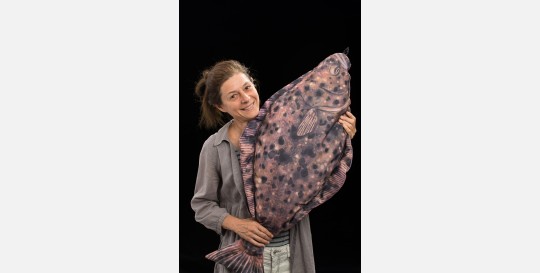Geneviève Lacroix
Natural Environment

- genevieve.lacroix@naturalsciences.be
- +32 2 627 42 99
- 0000-0002-3227-0000
Geneviève Lacroix is an ecosystem modeller specializing in the development and application of biogeochemical, individual-based, and larval transport models. Her research focuses on assessing the impact of anthropogenic pressures and natural variability on marine ecosystems in regions such as the North Sea, Southern Ocean, Gulf of Guinea, and Vietnam.
Function
Geneviève Lacroix is an ecosystem modeller at the Royal Belgian Institute of Natural Sciences (RBINS), where she leads the Ecosystem Modelling team (ECOMOD). An oceanographer by training, she specializes in developing and utilizing biogeochemical, individual-based, and larval transport models. Her research aims to evaluate the impacts of anthropogenic pressures and natural variability, as well as to test the effect of management and climate change scenarios on marine ecosystems. She applies these marine ecosystem models to study regions such as the North Sea, Southern Ocean, Gulf of Guinea, and Vietnam.
Research team: Ecosystem modelling (ECOMOD)
Research theme: Science for a sustainable marine management
Current Project(s)
CLIMDIS - Management of the water quality in Vietnamese coastal waters impacted by CLIMate change and human induced DISasters using a marine modelling tool. Funding: Belgian Science Policy (Bilateral Vietnam) – BL/36/VT43 (2019-2024) - Coordinator
DISARM - Dumpsites of munitions: Integrated Science Approach to Risk and Management. Funding: Fonds Wetenschappelijk Onderzoek – Vlaanderen (FWO) – S003719N (2020-2024) - Participant
ReCAP - Regional scale assessment of the land ocean continuum ecosystems vulnerability to anthropogenic pressure. Funding: Belgian Science Policy – FED-tWIN2019-prf-008-ReCAP (2020-2031) - Promotor
COST-SEA-UNICORN - Unifying Approaches to Marine Connectivity for improved Resource Management for the Seas. Funding: EU – COST ACTION CA19107 (2020-2024) - Participant
OUTFLOW - Quantifying the cOntribUTion of Fouling fauna to the Local carbon budget of an Offshore Wind farm.
Funding: Belgian Science Policy (BRAIN-Be 2.0) – B2/212/P1/OUTFLOW (2021-2025) – Participant
DE-HEAT - Natural analogues and system-scale modeling of marine enhanced silicate weathering
Funding: Belgian Science Policy - RV/21/DEHEAT (2021-2025) - Co-promotor
CANOE - Climate chANge impacts on carbon cycling and fOod wEbs in Arctic Fjords. Funding: Belgian Science Policy - RV/21/CANOE (2021-2025) – Co-promotor
EcoMPV - Eco-designing marine photovoltaic installations. Funding: FPS Economy (Energy Transition Funds) (2022-2025) – Participant
Shrimp-II - Application du modèle COHERENS pour améliorer la gestion des stocks de crevettes au Bénin. Funding : CEBioS program – DGD (2024-2028) – Co-promotor
GTI-DNA-Shrimp - Vers une meilleure connaissance spécifique des crevettes des eaux douces, saumâtres et salées du complexe Lac Nokoué - Océan dans le Sud Bénin. Funding : CEBioS program – DGD (2024-2025) – Co-promotor
Area of Expertise
Geneviève specializes in developing and applying 3-dimensional biophysical models, including biogeochemical, individual-based, and larval transport models, in regions such as the North Sea, Southern Ocean, Gulf of Guinea, and Vietnam.
External activities
Geneviève participates in eutrophication modelling initiatives within the OSPAR Working Group's Intersessional Correspondence Group on Eutrophication Modelling (ICG-EMO). She is regularly consulted as a eutrophication expert for the MSFD and WFD. She represents Belgium in the Working Group on Integrative, Physical-Biological, and Ecosystem Modelling (WGIPEM) of the International Council for the Exploration of the Sea (ICES) and is involved in the International Research Group on Marine Connectivity (iMarCo).
Professional Experience
Geneviève Lacroix completed a PhD in marine ecosystem modelling jointly with University Pierre et Marie Curie (France) and the University of Liège. She started her scientific career at the University of Liège, where she developed an ecosystem model for the Mediterranean Sea. She then moved to RBINS in 2002, working on the development of biogeochemical, individual-based, and larval transport models, applying them to evaluate the impacts of anthropogenic pressures and natural variability on marine ecosystems in regions such as the North Sea, Southern Ocean, Gulf of Guinea, and Vietnam.